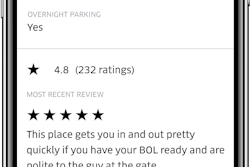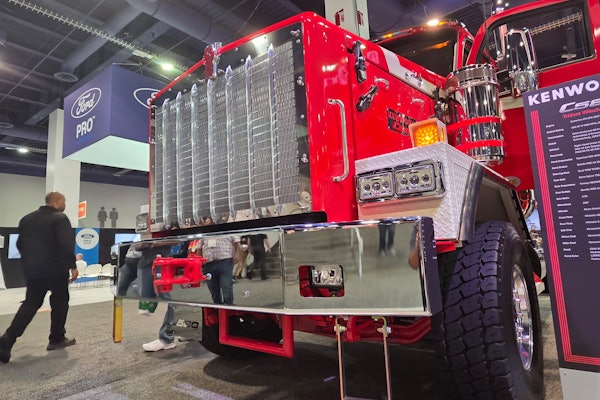
I spoke this morning with Hallahan Transport owner-operator Rob Hallahan, based in La Crosse, Wisconsin. While the reason I was calling initially had to do with a few questions about his move beginning this past Spring toward building up his previously one-truck business with other owner-operators leased on (he’s sitting at 4 owner-ops in addition to himself at this point, but more on that later), Hallahan dropped another little nugget on me from his location in Morris, Ill., at A&R Packaging, where the temps stood at a balmy …

That was up from overnight lows of -21, he said, as Hallahan and two owner-ops waited for the location to open at 10 a.m.
“I got to this place yesterday to deliver at 1 p.m.,” he said, on what’s been something of a regular run through a somewhat regular broker of late. Not regular enough, apparently, for anyone to care enough to let him know that the facility was closing due to the weather. Hallahan and company were only greeted by signs at the facility saying that “they’d closed for the weather” and would reopen at the aforementioned time, he said. “We’ve been sitting here since yesterday. It’s really set us back for the week — we were all supposed to unload last night,” and hauls already booked back toward the La Crosse area had to be canceled. “If we’d have know they were going to close we would have just stayed home.”
 Owner-operator Rob Hallahan (pictured, left, with fellow owner-operator Brian Bucenell) in 2017. Catch multiple views on Hallahan’s 2019 KW via this link.
Owner-operator Rob Hallahan (pictured, left, with fellow owner-operator Brian Bucenell) in 2017. Catch multiple views on Hallahan’s 2019 KW via this link.If anyone out there not in trucking continues to wonder over the angst that exists among truckers around the subject of brokers/shippers/receivers and detention, here’s a clear example. If those parties — regular customers of this operation, mind you — are doing their jobs, Hallahan knows at least about the possibility of closure at the other end before he even picks in Minnesota, just north of his home location, or if not by then certainly before three truckloads get so far into the run that they learn of it via signs posted on the premises.

He’s not the only trucker who dealt with similar closures yesterday — take note of small fleet owner-op Daniel Davidson’s experience yesterday morning in Northern Ohio, as detailed in this story. Davidson was close enough when he got a load cancellation to bring it all back to the house, at least. As for Hallahan and company, as we spoke he checked in for delivery, some time went by as we talked, and then he was informed: “She just told me they’re not taking any deliveries today. I’m taking it back to Minnesota.” And to recap: “We loaded yesterday morning at 7 a.m., got here at 1 p.m., and sat here till today,” only to be told” “‘Sorry, we’re not taking those today.'”
 What’s been your experience during this week’s record-setting low temps in various parts of the country? If you’re reading on a smartphone, tap the image to call and weigh in with a message on our podcast line. If you’re on a desktop, call 530-408-6423. Make sure to tell us your name and state of residence. Alternately, drop a comment below.
What’s been your experience during this week’s record-setting low temps in various parts of the country? If you’re reading on a smartphone, tap the image to call and weigh in with a message on our podcast line. If you’re on a desktop, call 530-408-6423. Make sure to tell us your name and state of residence. Alternately, drop a comment below.Hallahan had a planned bit of R&R with his wife starting tomorrow and running through the weekend. “I’ll have to call these brokers and work this out,” likely to be an all-day affair, he added, though he suspected he’d get offered no more than $100-$150 for detention, whatever rate he worked out for the wasted trips to Morris and back.
Reminds me a bit of a conversation I had recently with Eagle Express owner Leander Richmond, fresh off getting somewhat similarly burned on detention by a Nucor facility in (decidedly warmer) South Carolina. Near 100 percent of the time in load contracts anymore, Richmond said, “we get our detention agreement up front, so this is never a problem.”
Yet in the process of getting a new dispatcher in the Eagle operation up to speed, the reason for that was re-emphasized as detention got overlooked in the process of booking. As Richmond described it:
1400 “appointment” time. We arrived at 1335. Our driver was loaded at 1935. Because of this, he did not make delivery before [the next appointment time of] 1200 [the following day]. The consignee, who was onsite, open for business and working, refused to unload him.
That, of course, led to more waiting. Over multiple calls to the broker, Richmond insisted pay for the wasted time at both ends, requesting $900. He paraphrased four things he was then told, all of “which say something sad about the industry,” he added:
- I’ve been doing this for years and this is the first time that anyone has ever requested this much.
- A few months back, we had 20 trucks in there and the plant was down for 26 hours. You know how many trucks got detention? One. Nucor doesn’t pay detention.
- I offered you $156 and you said no!
- Why should I have to pay for your driver. This is the trucking industry.
The last one “sent me over the top,” Richmond said. And there was more. “But the point in this is that in this economy, power units can make the same demands of brokers that they would make of a shipper. These guys hauling steel and anything for these large companies need to all make a pact to not sign a rate confirmation that does not include a detention agreement: $40-$75 an hour after 2 hours in 15 minute increments.
“If a plumber showed up and was not working, he would be paid because he charges by the hour as a condition of his arrival. The same is true for electricians, pipe fitters and anyone else that services these locations. Why is it not true for trucks?”
And speaking of detention …
Operators at the Port of Baltmore took to the weather yesterday to protest excessive wait times at the Seagirt Marine Terminal for containers there, managed by the Ports America Chesapeake company and plenty busy of late, reported Colin Campbell for the Baltimore Sun. To wit, from Campbell’s reporting:
The company paid for port dredging and four super-sized cranes, but truck drivers like David Ross say it hasn’t scaled up with adequate labor and equipment to handle the work. Ross was one of the roughly 50 truckers who picketed Wednesday outside the terminal’s entrance on Broening Highway.
“Management’s trying to get more for less,” said Ross, a second-generation trucker who lives in Rosedale. “They’re not putting on the right amount of crews to handle the volume of the trucks.”
Read Campbell’s well-sourced look at volume growth and growing delays for truckers there via this link.
… and protests
Owner-operator Hallahan was on hand in Effingham, Ill., at the spot where this past Saturday’s “slow roll” convoy northbound on I-57 ended up after starting around 100 miles south in Marion in a bid to garner press attention for the notion of a trucking shutdown April 12. Knowing a few of the truckers involved, he was hauling southbound that day and stopped to await the convoy arrival there at its terminus, later roped into conversation with local journalists covering the event. Hallahan’s been involved in related efforts by various groups and owner-ops around regulatory influence since such efforts grew ahead of the ELD mandate in 2017 — though he didn’t participate in the slow roll directly, his thoughts on small trucking in the battle for better state parking support and against what he and many others see as self-serving regs unduly influenced by large trucking you can read in this considered report on the event from the Effingham Daily News.
Hallahan notes the slow roll convoy started with around 20 or so participants, gaining some numbers along the way. Hallahan estimates 40-50 participants, including some personal vehicles, at end when he watched them come in.










